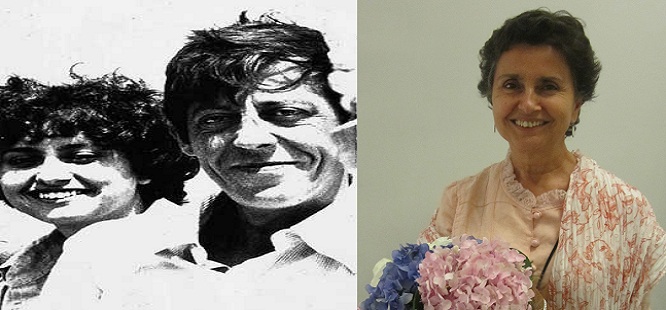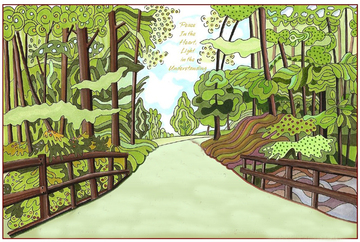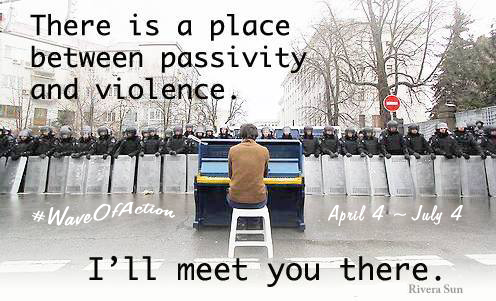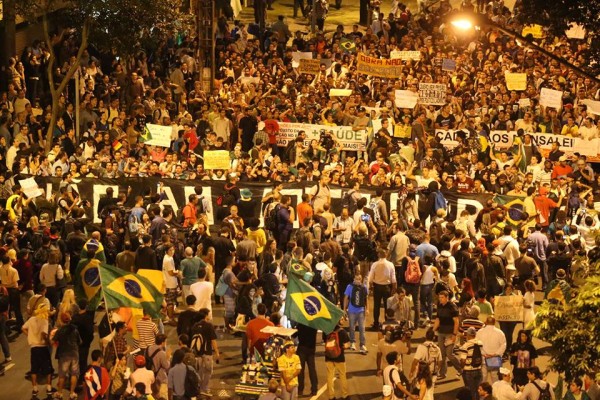ProMosaik interviews the peace activist Pia Figueroa Edwards

recognise that humanism and pacifism is the right way to go in life?
were living the sixties; the time of Vietnam, the Beatles and Che Guevara.
These were times in which there was no indifference because commitment lurked
in every corner. What moved us then was in the social soul or within oneself,
it was a culture that demanded freedom. In such atmosphere of phosphorescent
colours the lifestyle in which we’d been formed felt too constrained.
teaching is not for the triumphant, but for those who carry failure in their
hearts”, said Silo on a little card distributed door to door. I
immediately recognised this sentiment. Nothing that the system offered me gave
me comfort, the need for a new world was burning within me, the failure of
expectations had left me in a situation of search and the options that I had to
hand ranged from drugs to armed terrorism, via a trip to Kathmandu,
psychoanalysis or liberation theology.
those convulsed and radical sixties, while new TV screens were broadcasting the
weightless steps of the first man to walk on the moon, a simple man wearing
white overalls, at the foot of Mount Aconcagua gave his first public speech in
front of hundreds of followers who converged to listen to him despite the wind
and the snow, defying the batteries of machine-guns that were manned by the
border guards of Ongania’s Argentine government.
was the speech known as ‘The Healing of Suffering’ which Silo gave on the 4th
of May 1969, proposing a nonviolent way through which we could change the world
and overpass our own internal violence. Among those present was a Chilean,
Antonio Carvallo, who created the first groups in my city and through whom it
was easy for me to join in.
began the adventure of Humanism, a path of profound personal and social
transformations that I would travel over the following decades, reaching to the
confines of the mind and also the most remote places of our planet.

treat others as you would like them to treat you”. It is by the exercize
of non-violence and non-discrimination that we are orienting ourselves towards
a future Universal Human Nation.
As Silo said at the Nobel
Peace Laureates Summit: “As we all know, the themes of ecology and
environmental protection have taken root in our societies. While some
governments and certain stakeholders deny the dangers of neglecting the
ecosystem, they are nonetheless being obliged to take progressive steps because
of the pressure of a population increasingly concerned about the deterioration
of our common home. Even our children are becoming more aware each day of the
dangers of the situation. Through the media, and even in the humblest schools,
attention is paid to issues of preventing environmental deterioration and no one
can escape these concerns.
But we’re considerably
behind this when it comes to concern over the issue of violence. What I mean is
that the defence of human life and the most basic human rights have not yet
taken root at a global and general level. It seems we’re still apologists for
violence when it comes to arguing that it’s for defence or even ‘preventive
defence’ against possible aggression. And even massive destruction of
defenceless populations doesn’t seem to horrify us. Only when violence touches
us in our civic life through violent crimes do we become alarmed, but we still
do not stop glorifying the bad examples that poison our society and children,
starting in earliest infancy.
It’s clear that both the
idea and the sensibility that would provoke a profound repudiation and moral
disgust that will move us away from the horrors of violence in its various
forms have yet to take hold.
For our part, we will
make every effort to install in the social environment the validity of the
themes of Peace and Nonviolence and it’s clear that the time will come when
both individual and mass reactions will be produced. That will be the moment of
a radical change in our world.”

MR: What does humanism and pacifism
means for your personally?
is to learn to make the qualitative leap that our specie is needing, in order
to live in conditions in which every human will be able to develop without
having to experience pain or suffering. It means an extraordinary audacity. Is
there anything more important, more fascinating than this?
would rather tell you about what people has done with my last book, called
“Silo, the Master of Our Times”: they have translated it into
English, French, Italian and Portuguese, even some of the stories have been
translated into Hungarian, Check and Greek. Aside from circulating it as e-pub
and other digital formats, it has been printed in these different languages and
of course in the original Spanish version. And people have organized public
presentations of the book in universities, bookstores, halls, book fairs,
theaters, art galleries, etc, making it become an experience of inspiration and
joy. I have already presented it in 36 occassions, none of them similar to the
other one – since thay are done according to the culture of the place and to
the needs of the people that organize the event – and I have to still go to
Mexico at the end of this year and to Greece on the next one, to meet this
great people that is reading about Silo and wanting to share his message and
proposals.
actually, I do not write only books or research studies. My main activity is
writting and editing for Pressenza, international press agency that focuses on
non-violence, disarmament, humanism, non-discrimination and human rights, as
many other volunteers do along the world. Daily we are giving opinion regarding
what is happening, proposing a different way of looking at the facts, searching
for the inclusive attitude and reconciliation, proposing a non-violent
alternative in front of the current discriminations and conflicts. We are
interviewing so many people that share this new sensitivity and are building
new ways of organization, new social movements and cultural expressions, new
economical and political proposals and we are building a huge net of
relationships among those that share the aspirations of a new humanized
horizon.
certain that if a humanist point of view would spread, a new future would be
build, since we would assume that it is possible to organize society in a
different way and that we are a great majority of people claiming for justice,
disarmament, reciprocity and fairness.

MR: What are the 4 most important
things you would like to transmit to the next generation?
think we should pay a lot of attention to young people; they’re the future
that’s coming. They’re starting with what’s new, that’s for sure. Because
generations don’t succeed one another meekly, they always succeed one another
with generational clashes and dialectics. The values that are established in
older generations don’t interest them. Generations don’t succeed one another
peacefully. We can already see this and it’s not difficult to understand.
What’s happening is that they don’t have the same values.
be surprised if this time it’s in reverse! It may be that the others, the
adults, now turn out to be very superficial while young people achieve
profundity. Young people are now appearing. They’re something else; something
extraordinary. They’re fulfilling our expectations. The others, those over
forty years old, they’ve had their chance, and what have they done other than
get themselves comfortably established? They don’t seem to have substantially
changed anything. They’ve done nothing more than find their comfortable little
place in the system. The youngest are seeking references, not in the mass media
or among those in collar and tie. All you have to do is put yourself in tune
with young people and you’ll perceive it. Here in Chile, in Spain, Greece, Hong
Kong, Istambul, Sao Paulo or New York.

people are appearing on the public scene in all latitudes, they’re a global
phenomenon, very active, all very messy, but with new impulses, they’re
creative, rebellious. There they are, moving. This new generational layer is
appearing. Young people don’t want to participate in anything that’s
contradictory for them, they don’t want to be complicit in the disgusting
things they see. How else could they be with the pressures they face?
can notice the presence of a new generation that’s already in motion on the
historical scene and that doubtlessly is producing its manifestations.
Fraternity and justice are returning to find space in the hearts of young
people. This is really happening and I only have to learn from them, support
them, help them if I can. I just would like to transmit them hope, gratitude,
joy and support.
MR: What have you achieved until now
with your work and what are your objectives in the near future?
try to feel what I think is correct and to do what I feel is important, so
there is no contradiction among what I think, feel and do. And that is already
so much!
As for the near future, I feel I am launched on this direction and will keep
moving forward, giving diffusion to the proposals of a peaceful and nonviolent
world.


